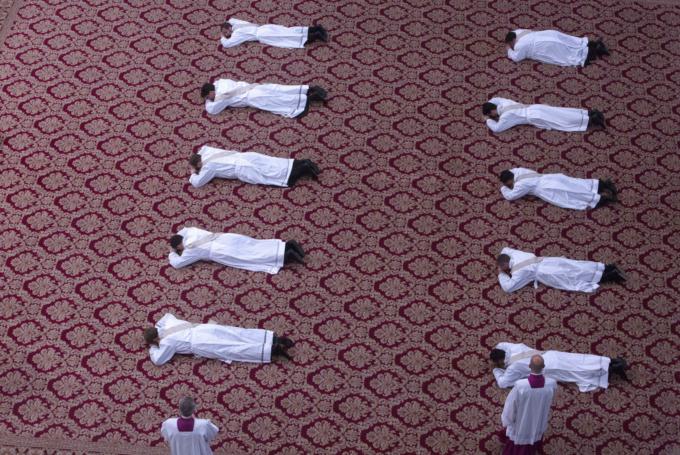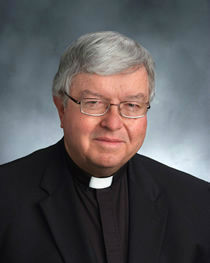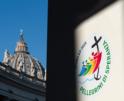
Faith
Most social scientists who have studied the issue believe that the percentage of homosexuals within the Catholic clergy is somewhat higher than among American males generally, since priests are already a self-selected group who have chosen not to marry.

Doyle
Q. I have heard that 60 percent of Catholic priests are gay. Is this the truth? (Cedar Rapids, Iowa)
A. Frankly, no one has an accurate answer to your question. Numbers vary widely, and I have seen "guesstimates" that range from 10 percent to 60 percent. My belief is that the reality tends toward the lower end of that scale.
In a 2002 national survey of priests by the Los Angeles Times, 9 percent of respondents identified themselves as homosexual, and another 6 percent said that they were "somewhere in between but more on the homosexual side."
Most social scientists who have studied the issue believe that the percentage of homosexuals within the Catholic clergy is somewhat higher than among American males generally, since priests are already a self-selected group who have chosen not to marry.
The church always distinguishes, of course, between a homosexual orientation, which is not considered sinful, and homosexual acts, which are. A priest -- whether gay or straight -- is pledged to be celibate.
The church's Code of Canon Law notes that "clerics are obliged to observe perfect and perpetual continence for the sake of the kingdom of heaven and therefore are bound to celibacy which is a special gift of God by which sacred ministers can adhere more easily to Christ with an undivided heart and are able to dedicate themselves more freely to the service of God and humanity" (Canon 277.1).
In 2005, the Vatican's Congregation for Catholic Education said that men should not be admitted to the seminary who "practice homosexuality" or "present deep-seated homosexual tendencies."
That guideline, repeated by the Vatican's Congregation for the Clergy in a document issued in 2016, has generally been taken to mean not that everyone with a homosexual orientation must be denied admittance, but that homosexuals incapable of living a celibate life cannot be priests.
Such an interpretation would seem consistent with Pope Francis' oft-quoted response to journalists aboard a papal flight in 2013; when asked about clerics who are gay, the pope said: "A gay person who is seeking God, who is of goodwill -- well, who am I to judge him?"
Many Catholics have known gay priests who remained faithfully committed to celibacy and who served the church effectively and with distinction.
Q. I am trying to learn the requirement as regards a forthcoming wedding. In this case, the husband-to-be is Catholic, and the wife-to-be is Baptist. Does the marriage have to be blessed before the wife can convert to Catholicism? Or is it the opposite? (City of origin withheld)
A. The wife-to-be may become a Catholic at any point she wishes -- either before or after the marriage ceremony -- but there is no requirement that she do so at all.
To become a Catholic, she would need to take a course of instruction in the Catholic faith. Typically, that would include weekly sessions over a period of eight or nine months, but the length is somewhat flexible depending upon the seeker's familiarity with Catholic teachings.
My own pastoral instinct -- and I have conveyed this to couples -- is to put off the spouse's reception into the Catholic Church until after the wedding. With the proper permission, the couple can be married -- in a Catholic church and by a Catholic priest -- in a ceremony recognized by the church as a sacramental marriage, even though the bride is still a Baptist at the time of the wedding.
There are really two vital decisions being made -- one, to marry, and the other, to become a Catholic. These decisions are separate and distinct and should not be conflated.
Waiting until after the marriage assures that the program of convert instruction will not be rushed. Also, I would not want the wife to feel, some years later, that she had become a Catholic mainly so that the marriage ceremony could be "nicer."
- Father Kenneth Doyle is a columnist for Catholic News Service
Recent articles in the Faith & Family section
-
Scripture Reflection for Jan. 12, 2025, Feast of the Baptism of the LordFather Joshua J. Whitfield
-
Ancient wisdom for the modern desert: Bishop Varden on the Desert FathersDr. R. Jared Staudt
-
Holidays of Ordinary TimesLucia A. Silecchia
-
Why is Mary's perpetual virginity so controversial for Protestants?Jenna Marie Cooper
-
The jubilee of jubileesFather Robert M. O’Grady


















